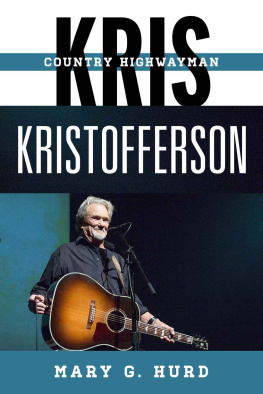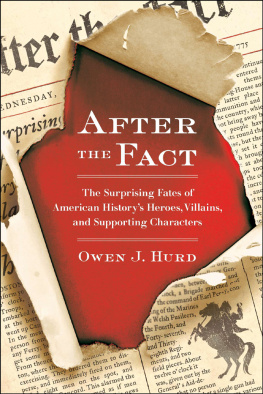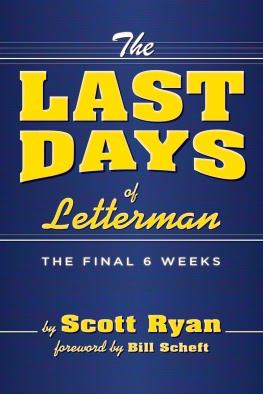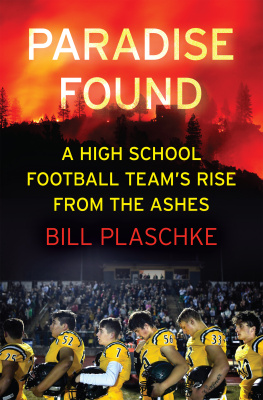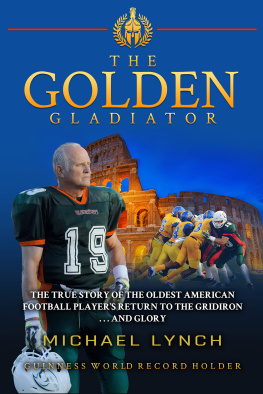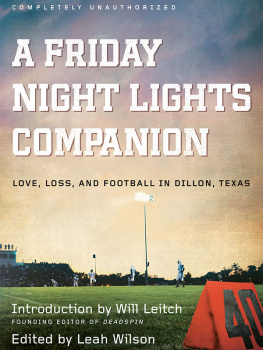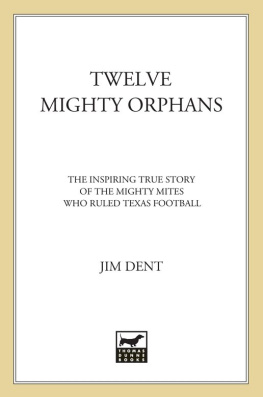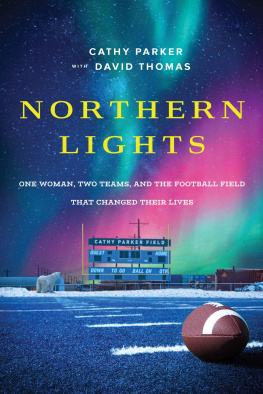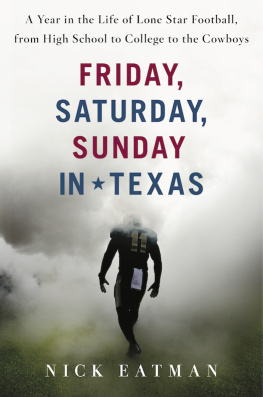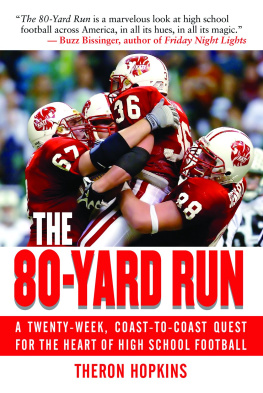Hurd - Thursday night lights: the story of black high school football in Texas
Here you can read online Hurd - Thursday night lights: the story of black high school football in Texas full text of the book (entire story) in english for free. Download pdf and epub, get meaning, cover and reviews about this ebook. City: Texas, year: 2019;2017, publisher: University of Texas Press, genre: Politics. Description of the work, (preface) as well as reviews are available. Best literature library LitArk.com created for fans of good reading and offers a wide selection of genres:
Romance novel
Science fiction
Adventure
Detective
Science
History
Home and family
Prose
Art
Politics
Computer
Non-fiction
Religion
Business
Children
Humor
Choose a favorite category and find really read worthwhile books. Enjoy immersion in the world of imagination, feel the emotions of the characters or learn something new for yourself, make an fascinating discovery.

Thursday night lights: the story of black high school football in Texas: summary, description and annotation
We offer to read an annotation, description, summary or preface (depends on what the author of the book "Thursday night lights: the story of black high school football in Texas" wrote himself). If you haven't found the necessary information about the book — write in the comments, we will try to find it.
Telling an inspiring, largely unknown story, Thursday Night Lights recounts how African American high school football programs produced championship teams and outstanding players during the Jim Crow era.
Hurd: author's other books
Who wrote Thursday night lights: the story of black high school football in Texas? Find out the surname, the name of the author of the book and a list of all author's works by series.
Thursday night lights: the story of black high school football in Texas — read online for free the complete book (whole text) full work
Below is the text of the book, divided by pages. System saving the place of the last page read, allows you to conveniently read the book "Thursday night lights: the story of black high school football in Texas" online for free, without having to search again every time where you left off. Put a bookmark, and you can go to the page where you finished reading at any time.
Font size:
Interval:
Bookmark:
NUMBER FORTY-SEVEN
Jack and Doris Smothers Series in Texas History, Life, and Culture
Thursday Night Lights
The Story of Black High School Football in Texas
MICHAEL HURD

University of Texas Press
AUSTIN
Publication of this work was made possible in part by support from the J. E. Smothers, Sr., Memorial Foundation and the National Endowment for the Humanities.
Copyright 2017 by Michael Hurd
All rights reserved
First edition, 2017
Requests for permission to reproduce material from this work should be sent to:
Permissions
University of Texas Press
P. O. Box 7819
Austin, TX 787137819
utpress.utexas.edu/rp-form
LIBRARY OF CONGRESS CATALOGING-IN-PUBLICATION DATA
Names: Hurd, Michael, 1949 author.
Title: Thursday night lights : the story of Black high school football in Texas / Michael Hurd.
Description: First edition. | Austin : University of Texas Press, 2017. | Includes bibliographical references and index.
Identifiers: LCCN 2017012988
ISBN 978-1-4773-1034-2 (cloth : alk. paper)
ISBN 978-1-4773-1484-5 (library e-book)
ISBN 978-1-4773-1485-2 (non-library e-book)
Subjects: LCSH: Prairie View Interscholastic League (Tex.) | FootballTexasHistory20th century. | School sportsTexasHistory20th century. | Discrimination in sportsTexasHistory20th century. | African American football playersTexasHistory20th century. | African American football coachesTexasHistory20th century.
Classification: LCC GV959.52.T4 H87 2017 | DDC 796.3309764dc23
LC record available at https://lccn.loc.gov/2017012988
doi:10.7560/310342
Contents
For my late parents, James D. Hurd, Sr. (Pemberton High School, Marshall, TX, ca. 1937), and Emily Jean Baxter Hurd (Dunbar High School, Texarkana, TX, 1943).
For my running buddiesheres to the good times when we were young and attending PVIL athletic eventsClaude Edwards, Lorenzo The Hog Houston, and Donald Ray Palmer.
For all of the coaches, players, administrators, students, and teachers who made the PVIL experience unique and successful.
To my good buddy, Terry Huffman, may he rest in peace.
Introduction
Immediately across the street from the Evan E. Worthing High School campus in south Houston, where Reed Road greets Scott Street, a roadside gauntlet of strategically spaced hitchhikers would line Scott headed north from Sunnyside to Third Ward in the late afternoon, shortly after school recessed for the day at three oclock. Their destination was Jeppesen Stadium, Houstons public school football arena, which was nested on the corner of Scott and Wheeler on the eastern fringe of Third Ward, the cultural and entertainment hub for black Houstonians.
Raised thumbs jabbed the air as the hitchhikers stared down the occupants of every vehicle, hoping to recognize at least one friendly face that would surely offer a ride, though thuggish types gave more a threatening, menacing scowl as the would-be passengers shouted the question of the day, Goin Third Ward?!
As a matter of fact, at that time of day, on a Wednesday or Thursday in the fall when the 1960s Worthing Colts had a Prairie View Interscholastic League (PVIL) football game scheduled, it seemed just about every able body in Sunnyside was Third Wardbound, and most of the cars and their passengershitchhikers toowere adorned with some kind of green-and-gold clothing or trinket. Giggling teenage girls standing at bus stops shook pom-poms back and forth, their green-and-gold strands having survived the afternoons pep rally, and similar strands knotted to car radio antennas flew freely in the breeze, creating a flickering green-and-gold stream as the vehicle accelerated. A nonfootball athlete making his way to the game might sport a bright green lettermans pullover sweater emblazoned with a centered yellow H with the word Worthing sewn in green across its bar.
My game-day road to Jeppesen began amid the mania of three teenagersmy sister, brother, and mescrambling to get ready for school, taking turns in the bathroom, and mother putting lunch bags together, though she also had to get ready for school, teaching second-graders at Kay Elementary, and dad having coffee as he read Mickey Herskowitzs column in the Houston Post sports section. From the kitchen, Clifton King Bee Smiths ever-cheerful voice from radio station KCOH blasted through the speakers of our General Electric clock radio, stationed on the kitchen sinks tiled counter and reverberating throughout our bandbox of a three-bedroom house. Houston had two major black radio stations, KCOH and KYOK, and we would go back and forth, listening to both, but on game-day mornings it was usually King Bee, who agitated fans about that evenings game while alternately spinning the latest R&B tunes from Motown, Stax, and Don Robeys Peacock label. King Bee would take phone calls from listeners, but in between the rants of alumni and students defending their teams, he would sing a taunting tune (it sounded something like Duane Eddys Raunchy) about the outcome of the nights game, for example, Yates gonna beat the devil outta Worthing, Yates gonna beat the devil outta Worthing. I would go off to school with that damned tune rattling around my brain, and it would still be there while I sat in math class trying to make sense of algebraic equations. After school, I would walk home with my transistor radio earplug in place, listening to KCOHs late-afternoon DJ, Skipper Lee Frazier, who was bringing a mountain of soul to Houston, as he rapped in the shows intro from an audience-friendly studio walled with a semicircle of large vertical panes of tinted plate glass facing Almeda Road on Third Wards western border. When you passed by and waved, Skipper Lee returned the favor with a deep, cackling laugh and responded on air, Hey, hey, Chevrolet!
My dad, a welder, had played football in Marshall, Texas, at Pemberton High School in the late 1930s. He was a huge sports fan. On nights when Worthings games didnt conflict with his night shift at the Armco Steel Mill in Pasadena, he would gladly toss me the keys to the big Pontiac Grand Prix and away I would go, picking up my running buddies Donald Ray, Claude, and Lorenzo the Hog, and maybe we would pack in a hitchhiker or three, all in the name of school pride. On game nights, south Houston high school football fans motored, thumbed, walked, or bused their way for five miles up Scott Street to Third Ward, bouncing and bumping across the railroad tracks at Holmes Road, through South Union, with its bustle of black businesses and middle-class homes, over Old Spanish Trail Road and through the heavily Jewish MacGregor neighborhood, with its stylish brick mansions, to Brays Bayou, before finally catching a glimpse of the stadium lights halo glowing brightly against the early-evening sky.
And then you were inside. The game began, and what you saw, what you have heard about, what you will be talking about in homeroom the next day at school and maybe for years to come unfolded in a tapestry of athleticism, speed, power, and showmanship, all to the beats of thundering bass drums and blaring brass sections from dueling school bands seated in the stands on diagonally opposite sides of the field. The faces were blackplayers, coaches, officials, the great majority of fansand represented Houstons black communities, which descended on Jeppesen to cheer their neighborhood teams: Third Ward had the Yates Lions, Fifth Ward was for the Phillis Wheatley Wildcats, North Houston had the Kashmere Gardens Rams, Independence Heights was Booker T. Washington Eagles territory, Sunnyside had Worthing, and from the Gulf Coast came visitors like Charlton-Pollard and Hebert from Beaumont, Port Arthur Lincoln, and Galveston Central.
Next pageFont size:
Interval:
Bookmark:
Similar books «Thursday night lights: the story of black high school football in Texas»
Look at similar books to Thursday night lights: the story of black high school football in Texas. We have selected literature similar in name and meaning in the hope of providing readers with more options to find new, interesting, not yet read works.
Discussion, reviews of the book Thursday night lights: the story of black high school football in Texas and just readers' own opinions. Leave your comments, write what you think about the work, its meaning or the main characters. Specify what exactly you liked and what you didn't like, and why you think so.

